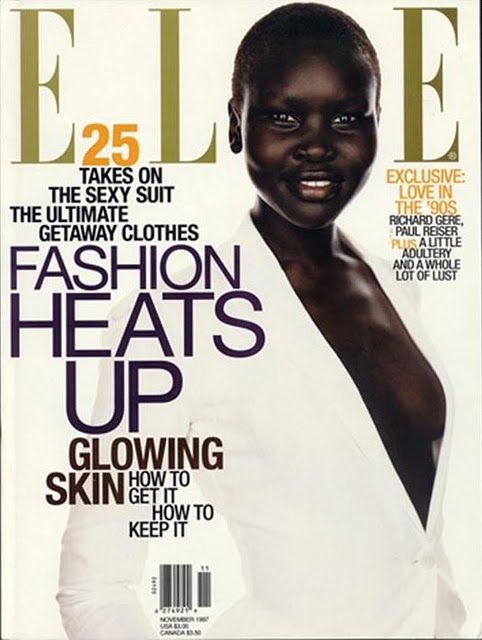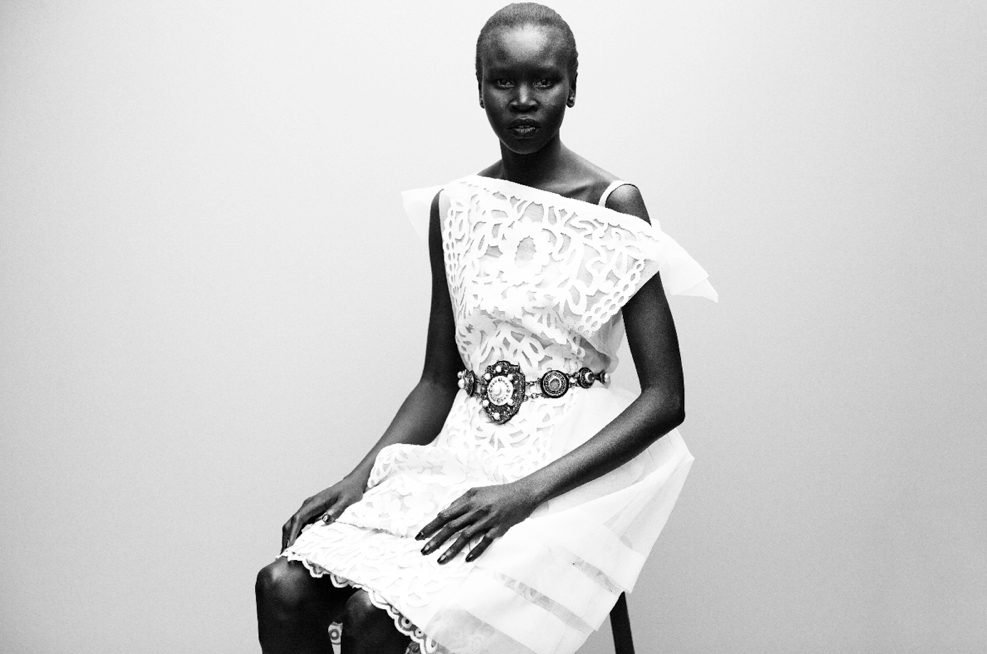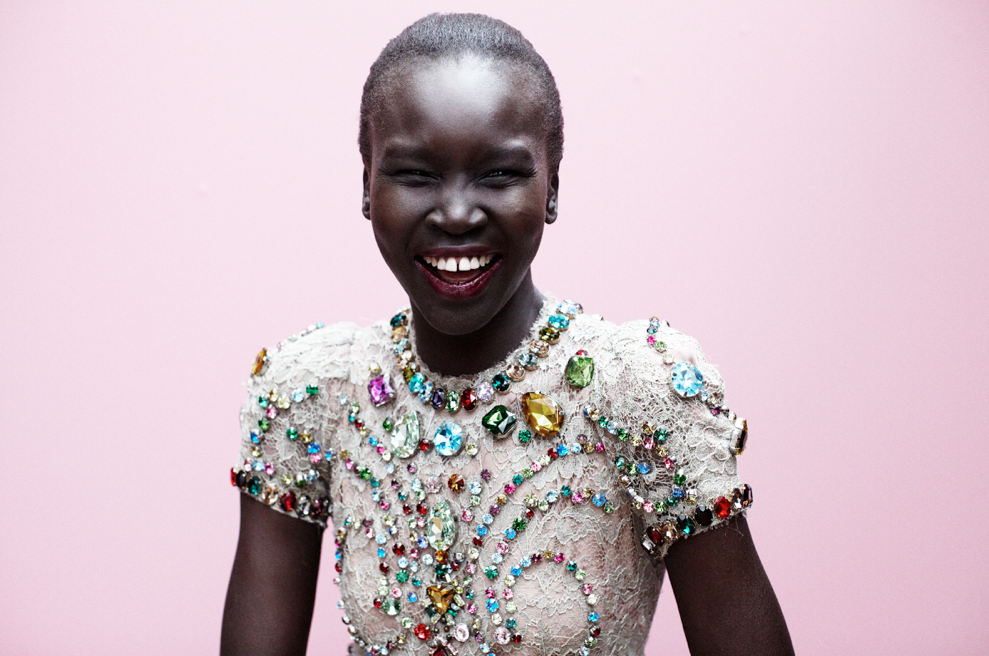British-Sudanese model Alek Wek (IMG Paris) was the first African model to appear on the cover of ELLE magazine (in year 1997.), and her stellar modeling career has allowed her to also work as philanthropist, designer and author. These days she is also working with the United Nations High Commissioner for Refugees to help the country develop and grow.
In the interview for The Wild magazine, Alek talked about South Sudanese freedom, the strength of family, that iconic ELLE magazine cover, and the things that bind us.
Trailblazer. Philanthropist. Supermodel. Designer. Author. Any and all of these can be used to describe Alek Wek, though none would be possible without the first: Survivor. The WILD sits down with the indelible Wek and talks South Sudanese freedom, the strength of family, that iconic magazine cover, and the things that bind us.
In reading your book, it seems as though you’ve lived a million lives. Many expected a memoir that mentioned your childhood, almost in passing, and then delved straight into your life in fashion. It was refreshing and different.
Thank you. It’s definitely at not a book about glamour. At the time, I was coming to my late twenties and into my thirties; I was in my own bubble. When I came back from doing the BBC documentary in Sudan, it was difficult to go back on set and just “Hey, hi, how are you? Oh, fabulous, darling!” It was so strange, you know? That’s when I realized that the memoir was not just what I went through, and that instead of just reading it in newspapers, or little sound bites, whether on BBC or CNN, people could see it through my eyes. You never really see it through someone who actually lived it. I thought this story needed to be heard, and it wasn’t easy; it was in fact very painful. Sometimes, when we go through certain experiences and traumatic moments, we don’t want to revisit them. But, however hard it was, I truly believe as people, we really can strengthen each other by telling our stories. We may think we’re so different, but we all share the same fundamentals: family is family, values are values, honesty is honesty.
And that transcends everything else.
Absolutely. And we have to be able to address the past to move forward. It also actually gave me a different outlook when I came back to my day job, where I started modeling in moderation. Now, my mother’s like “The clock is ticking!” I do have eight brothers and sisters.
That never seems to change with moms!
It doesn’t! First it was education, and when that was all done, it became, “Oh, this modern world. Where are the babies?” Let’s blame the modern world!
You’ve spoken a lot about her strength and the role she’s played in your life. If there was one lesson you’ve learned from her, as a woman, that you could pass on to your future daughter, what would it be?
I never saw her give up. As a child, that kind of thing can really affect the person you become. For me, I feel that the way my mother was, if I didn’t grow up in that environment I don’t know if I would’ve had an understanding of what a woman should be. You know, what a woman’s worth, how she should be treated, the way she cares for herself and others. I would be lying, sitting here and saying I figured it out myself. There’s no way. Coming from southern Sudan and moving, there were so many challenges. Not just leaving, but being that age, in particular.
On top of moving to a different continent and being unfamiliar with everything, you’re at that stage where you’re becoming a young woman.
Yes! I immigrated to England to seek refuge and she joined me two years later, so I had a chance to kind of rebuild my life at that early, but still quite sensitive age of 14. I had to learn very quickly, and there was no way I’d be as steadfast as I was with life, school and everything if it wasn’t for what I learned from her and my father. There’s so much you’re going through – your teens, secondary school – but there was that cultural difference, too.
Your father was an education official in Wau, and in one of the last conversations you had before he died, he stressed how much he wanted you to finish your schooling. That must have played a big role in your success as well.
It had a great impact. It was very special in particular because a lot of fathers in Sudan never really embraced the idea of girls furthering their education. I can’t imagine how demoralizing and painful it is. That happens even today in the western world. I have friends that started families at a very early age, and it’s okay, everyone has their own choices. But imagine being a girl who wants to go to school, and can’t. Imagine being forced to marry, and even marry a person you don’t know. My father never said no to learning. It was always, “You can be a woman and further your education.” For him to have done so was very empowering. It takes a lot of confidence to go against the grain, against the norm. That’s why, when I was discovered on that Sunday afternoon, my mother was like, “Don’t mess around; forget this modeling business!”
You’ve had a stellar career, and your ELLE cover is regarded as a huge turning point in American fashion and beauty. Do fans still mention it to you?
Yes, it happens still! I’ve been blessed. The opportunity has opened so many doors in my life, and that moment, in particular, will always stay with me. I’ve always loved learning about different cultures; it still strikes me as strange that in a country so advanced, some people are viewed as more appealing than others just based on skin color. We’re all beautiful, and we’re really all the same.
The U.S. Committee for Refugees and Immigrants and World Vision sponsored your first visit back to Sudan when you were just twenty-one.
There was so much happening the country at that time, so much death and devastation. The stories I heard were terrifying. Women and children were being massacred daily. Modeling gave me a large platform to help bring attention to southern Sudan and I began speaking about it in interviews, and the USCRI contacted me. That was the beginning, really. Going back after all those years was such an overwhelming experience. Seeing it first-hand was heartbreaking.
UNICEF, Doctors Without Borders, World Vision, and the United Nations High Commissioner for Refugees are just a few of the organizations you work with to bring relief, awareness and change to South Sudan. What motivates you to continue?
All you want to do in a situation like this is help. During my first visit, I met a woman who walked for weeks with her two children, with nothing to eat, and she handed me her dying daughter. Her husband had been killed, and her other children died of starvation. How could I witness that and be still? I love my country and want to see it flourish. Suffering should never be tolerated, and as people of this world, we should strive to help each other, to take care of each other.
The BBC documentary in which you traveled back to Sudan, your second visit and your mom’s first since seeking refuge in London, was emotional to watch.
It was an emotional journey. My mom, she had us, but she had to leave her brothers and her sisters behind. When I got the opportunity to go back in 2005, obviously I wanted her to see her sister who she hadn’t seen in twenty years. I was really moved. You never see your parents that way; she was vulnerable. She lost her mom when she was so young.
There’s a moment in which she stands in front of your old home and points to nearby houses, explaining that every neighbor but one has died. It’s a compelling scene.
We are so fortunate. There are so many people who had nowhere to go, and perished as a result. My family had the chance to get out, but millions didn’t. There was so much senseless death. That moment in front of my home with my mother was a reminder of all I have to be thankful for, and how much work there is still left to do.
Much has happened in the time between that visit, and your planned visit with UNHCR in July to celebrate South Sudan’s first year of independence.
Every day brings change. There are days that bring much joy, and days of sadness. There are so many displaced families who have living in refugee camps for years. Many adults grew up knowing no other home but the camps. Can you imagine? I love my country and want to see it prosper. I’m always on the phone, speaking to UNCHR, working to try and figure out new ways to help. There’s so much anger and confusion after decades of war and that energy needs to be channeled into positive action. The country needs a chance to grow. It would be a dream to someday visit museums in South Sudan that house the history of my people.
Is that your WILD Wish?
My WILD Wish is to see South Sudan flourish. My wish is to see the young Sudanese have a chance. To see them do their thing. To see them shine.
This interview was taken from: http://thewildmagazine.com/woman-issue/a-womans-worth/
Images: thewildmagazine.com


